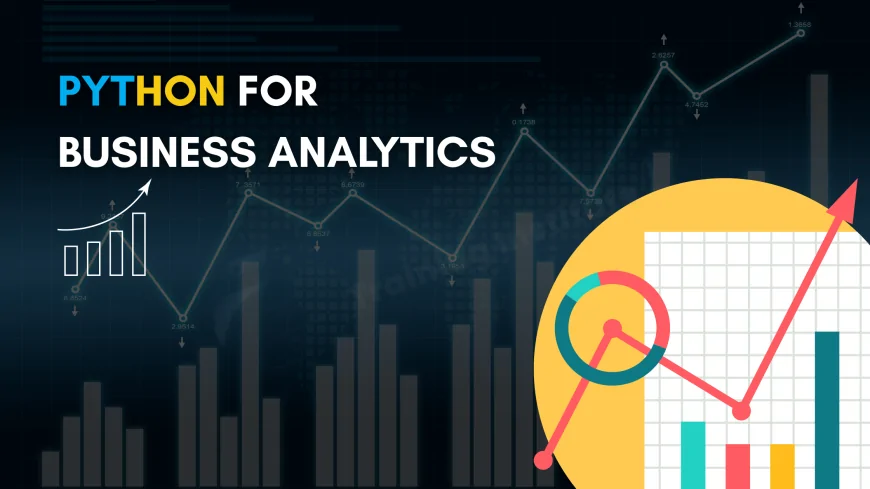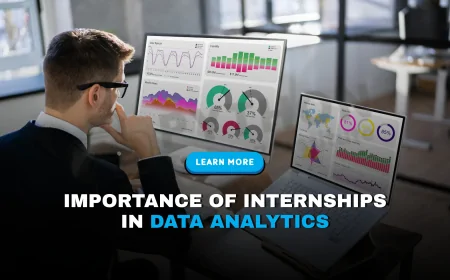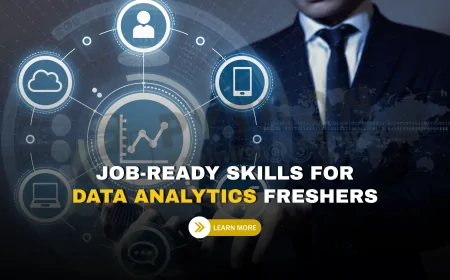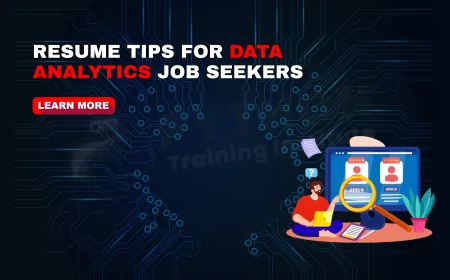Python Training for Business Analytics: Learn Data-Driven Decision Making
Master Python for business analytics with industry-focused training in Pune. Learn how to analyze data, create dashboards, and make data-driven decisions using Python. Enroll in a hands-on course at a top Python Training Institute in Pune to boost your business career.

In today's data-driven business environment, the ability to analyze and interpret data is crucial for making informed decisions. Python, with its simplicity and robust libraries, has become a go-to tool for business analytics. This guide delves into the various aspects of Python training for business analytics, highlighting its benefits, applications, and the skills you can acquire.
1. The Importance of Python in Business Analytics
Python's rise in the business analytics domain is attributed to its versatility and the extensive range of libraries it offers for data analysis. Its open-source nature and supportive community make it an ideal choice for businesses aiming to harness data for strategic insights.
2. Core Python Libraries for Business Analytics
-
Pandas: Essential for data manipulation and analysis, allowing for handling structured data effectively.
-
NumPy: Provides support for large, multi-dimensional arrays and matrices, along with mathematical functions.
-
Matplotlib & Seaborn: Used for data visualization, enabling the creation of static, animated, and interactive plots.
-
Scikit-learn: Offers tools for predictive data analysis and machine learning.
-
Statsmodels: Facilitates statistical modeling and hypothesis testing.
3. Applications of Python in Business Analytics
-
Descriptive Analytics: Understanding past data to identify trends and patterns.
-
Predictive Analytics: Forecasting future outcomes based on historical data.
-
Prescriptive Analytics: Recommending actions based on data analysis to achieve desired outcomes.
-
Customer Segmentation: Grouping customers based on behaviors and preferences for targeted marketing.
-
Financial Analysis: Evaluating financial data to assess performance and make investment decisions.
4. Benefits of Python Training for Business Professionals
-
Enhanced Decision-Making: Ability to derive actionable insights from data.
-
Increased Efficiency: Automating repetitive tasks and data processes.
-
Competitive Advantage: Leveraging data analytics for strategic planning and market analysis.
-
Career Advancement: Expanding skill sets to include data analysis capabilities.
5. Learning Path: From Basics to Advanced Analytics
-
Beginner Level: Understanding Python syntax, data types, and basic operations.
-
Intermediate Level: Learning data manipulation with Pandas and data visualization techniques.
-
Advanced Level: Implementing machine learning models and performing complex statistical analyses.
6. Real-World Use Cases
-
Retail: Analyzing sales data to optimize inventory and improve customer experience.
-
Finance: Assessing risk and forecasting market trends.
-
Healthcare: Predicting patient outcomes and optimizing resource allocation.
-
Marketing: Evaluating campaign performance and customer engagement metrics.
7. Choosing the Right Python Training Program
When selecting a Python training program for business analytics, consider the following:
-
Curriculum: Ensure it covers essential libraries and real-world applications.
-
Hands-On Projects: Opportunities to apply learning to practical scenarios.
-
Expert Instructors: Access to experienced professionals in the field.
-
Flexibility: Options for self-paced learning or live sessions to suit your schedule.
8. Integrating Python Skills into Your Business Role
-
Data-Driven Strategies: Utilize data analysis to inform business strategies and operations.
-
Cross-Functional Collaboration: Work with IT and data teams to implement analytics solutions.
-
Continuous Learning: Stay updated with the latest tools and techniques in data analytics.
FAQ's
1. What is Python training for business analytics?
Python training for business analytics teaches professionals how to use Python for analyzing business data, creating dashboards, and building predictive models. At Python Training Institute in Pune, the course is structured to offer hands-on projects, real-time business cases, and essential libraries like Pandas and Matplotlib for deep analytical skills.
2. Why is Python important for business analytics?
Python is crucial for business analytics due to its ease of use and rich ecosystem of libraries like Pandas, NumPy, and Seaborn. The Python Training Institute in Pune helps learners leverage these tools for data analysis, reporting, and decision-making, which are essential in business intelligence roles.
3. Who should join Python business analytics courses?
Business professionals, analysts, fresh graduates, and managers seeking data-driven decision-making roles should join. The Python Training Institute in Pune offers beginner-friendly modules for non-programmers and advanced techniques for experienced users, making it ideal for diverse learners.
4. Do I need programming experience to learn Python for analytics?
No, prior programming experience isn’t necessary. The Python Training Institute in Pune starts with Python basics and gradually progresses to data analytics concepts, making it accessible to business users from finance, marketing, HR, and other domains.
5. What tools will I learn in Python analytics training?
You’ll learn tools such as Pandas for data manipulation, Matplotlib and Seaborn for visualization, NumPy for numerical analysis, and basic machine learning with scikit-learn. The Python Training Institute in Pune also includes real-time dashboards and reporting with Jupyter and Python scripting.
6. Are certifications available after completing the training?
Yes, Python Training Institute in Pune provides certification upon successful course completion. These industry-recognized certifications enhance your resume and validate your skills in data analysis and business intelligence, making you job-ready.
7. How long does the Python analytics course take?
The course typically spans 6–8 weeks depending on the batch (weekday or weekend). Python Training Institute in Pune offers flexible learning paths, including fast-track and weekend sessions to suit working professionals.
8. What industries benefit most from Python analytics training?
Industries like finance, healthcare, e-commerce, logistics, and consulting use Python for analytics. The Python Training Institute in Pune tailors use cases for different sectors so learners can relate their projects to their professional backgrounds.
9. Can Python training help me switch careers into data analytics?
Absolutely! Many learners at the Python Training Institute in Pune have successfully transitioned into business analyst or data analyst roles after completing the course. The job-oriented curriculum bridges the gap between business knowledge and technical expertise.
10. Does the course include real-world business projects?
Yes, real-world case studies and industry-focused projects are a core part of the curriculum at Python Training Institute in Pune. These projects help simulate actual work environments, improving both your portfolio and practical understanding.
11. What is the average salary after Python analytics training?
Professionals with Python-based analytics skills earn competitive salaries. In Pune, business analysts with Python skills typically start at ₹5–8 LPA, and this grows with experience. Certification from Python Training Institute in Pune boosts employability and salary potential.
12. What roles can I get after this training?
You can work as a Business Analyst, Data Analyst, Reporting Analyst, BI Developer, or Analytics Consultant. Python Training Institute in Pune aligns its course with industry hiring needs, helping you confidently apply for these roles.
13. Is placement support available after completing the course?
Yes, Python Training Institute in Pune offers placement assistance including resume building, mock interviews, and job referrals. They have tie-ups with tech companies and analytics firms for hiring support.
14. Can I take this course online if I’m not in Pune?
Yes, the Python Training Institute in Pune offers both classroom and live online sessions. Their virtual classes include the same hands-on labs, mentorship, and assignments to ensure consistent learning outcomes.
15. Does the course cover data visualization techniques?
Definitely! Visualization is an essential part of business analytics. The course covers Matplotlib, Seaborn, and Plotly to help you create insightful, executive-level reports and dashboards.
16. How does this course compare to a general Python course?
Unlike general Python courses, this program at Python Training Institute in Pune focuses on business data, KPI metrics, dashboarding, and storytelling using analytics—specifically crafted for decision-making roles in corporate environments.
17. What support will I get during the training?
Students receive mentorship, access to recorded lectures, Q&A forums, and one-on-one sessions with trainers. The Python Training Institute in Pune ensures continuous learner engagement and problem-solving help throughout the course.
18. Does this course include Excel to Python transition?
Yes, many business users are comfortable with Excel. Python Training Institute in Pune includes Excel-to-Python transition modules to help learners adopt Python for more advanced and automated analytics.
19. Will I learn predictive analytics using Python?
Yes. The course introduces predictive modeling using scikit-learn. You’ll learn how to build and evaluate simple models to forecast trends, sales, or customer behavior, which are critical for business insights.
20. Is Python enough for a business analytics role?
Yes, when combined with domain knowledge, Python is a powerful tool for analytics. Python Training Institute in Pune ensures you learn not just syntax, but how to apply it to solve real business problems, making it highly valuable in analytics roles.
Your Python Journey Starts Here
Investing in Python training for business analytics equips professionals with the skills necessary to navigate the complexities of modern business environments. By mastering data analysis tools and techniques, you can drive innovation, efficiency, and strategic decision-making within your organization.
What's Your Reaction?
 Like
0
Like
0
 Dislike
0
Dislike
0
 Love
0
Love
0
 Funny
0
Funny
0
 Angry
0
Angry
0
 Sad
0
Sad
0
 Wow
0
Wow
0













